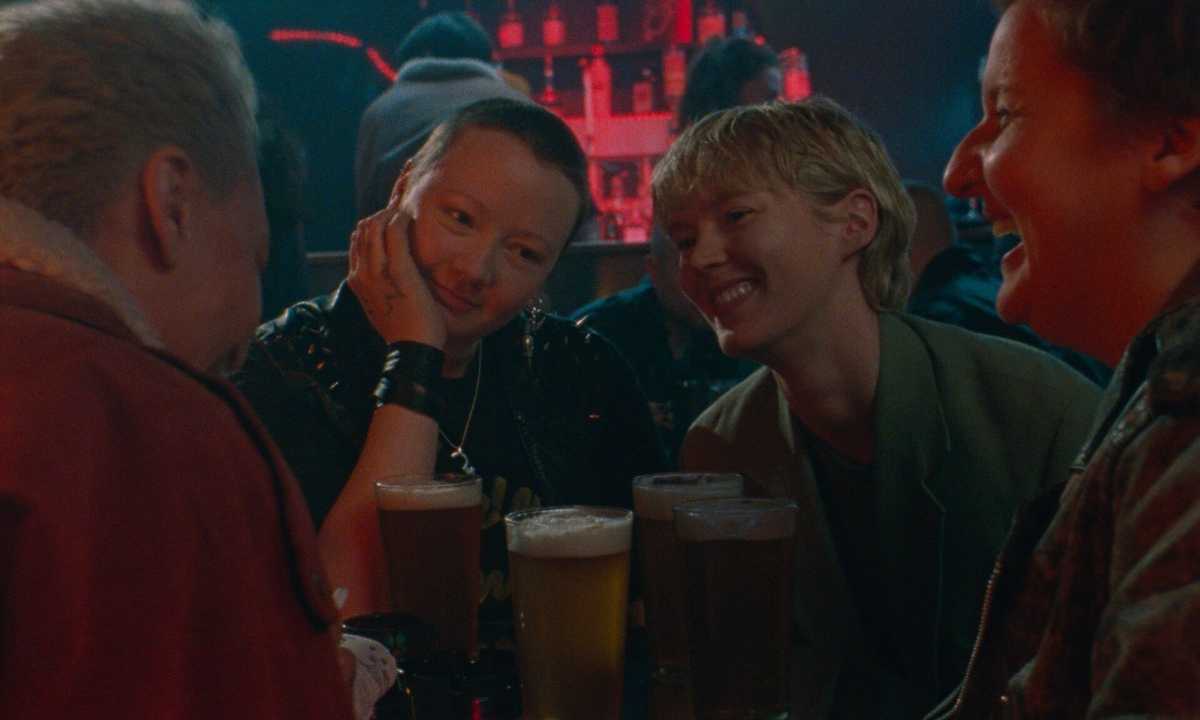The intimate, engaging character study, “Blue Jean,” probes the personal and professional crises of Jean (Rosy McEwen), a closeted lesbian in Newcastle, England in 1988. Prime Minister Margaret Thatcher’s anti-LGBTQ law, Clause 28 — which prohibited the “promotion of homosexuality”— is in effect, and Jean seethes silently whenever it is reported on radio or television. However, Jean does not want to call attention to her sexuality; she fears for her job as a secondary (high) school gym teacher.
In her feature debut, writer/director Georgia Oakley tells Jean’s story in a way that boxes viewers in with Jean as she tries to keep her double life secret. The film becomes suffocating, with Oakley favoring tight shots on Jean’s face as she experiences a series of struggles and setbacks. There are images of her in a bathroom or in her apartment that provide a sense of isolation. Oakley uses a raw, cool palette to keep things at a slight chill. There is a sense of sterility in the scenes set in Jean’s home, her school, and especially her sister Sasha’s (Aoife Kennan) house. This allows for the warmth of the safe space that is the lesbian bar frequented by Jean and her girlfriend, Viv (Kerrie Hayes), to be a nice contrast.
Jean is immensely likable as a character, even as she makes poor decisions. She often acts out of self-preservation. Jean avoids socializing with her fellow teachers, at the lunch table or after hours, declining offers for a pint, in part to protect her personal life. She tries to avoid conflict and confrontation, keeping to herself and muddling through. Watching her colleagues react to Clause 28 news is one reason she wants little to do with them.
Jean has what appears to be an easygoing relationship with Viv that involves nights out at a pub, or nights together having sex. A wonderful scene has them going on a motorcycle ride that ends at the beach where they are able to hold hands without any consequence. But whereas Jean wants to believe not everything is political, Viv responds, “Of course it is.” Their contrasting attitudes cause some friction in their relationship. Jean scolds Viv one day for calling her at work. “You don’t know what it’s like for me,” she says, hinting at the difficulties she might have if outed at school. McEwen makes her concerns palpable, becoming more anxious and cautious, trying to control things, and yet doing a poor job of that.
“Blue Jean” creates its central drama when Lois (Lucy Halliday), a new student, catches sight of Jean at the lesbian bar. Jean worries more about how Lois can destroy her life and career than about Lois’ well-being. Moreover, Lois creates a series of complications for Jean beyond just possibly outing her. In one instance, Viv suspects there is something going on between Jean and Lois because Jean does not initially identify Lois as one of her students. (At 15, Lois is underage.)
More issues arise when Lois fights with Siobhan (Lydia Page), at school. Jean cautions Lois that things are not fair, but, because she wants to maintain boundaries, Jean fails to support her further. As tensions heat up between Lois and Siobhan — who viewers can read as jealous because Lois is getting more of Jean’s attention — a situation arises that forces Jean to make a difficult decision.
“Blue Jean” is compelling as Jean reacts to the various situations that she encounters, and McEwen visibly presents this through changes in her body language, her facial expressions, and her demeanor. Viv, Jean’s friends, colleagues, sister, and students notice Jean’s change; Jean seems to be fooling only herself. But she is obviously troubled by her interactions with Lois, and McEwen shows how things weigh on her, which makes the film more intriguing. Watching Jean mishandle her teacher/student relationship with Lois, as well as her relationship with Viv, reveals the true nature of her character. Jean objects to her sister keeping an old photo of her, and Sasha responds by accusing Jean of trying to erase her past. Jean does not want to live in the past, but nor does she seem to want to live in the present. As for the future, a discussion Jean has with Viv in a café about their relationship is piercing.
As strong as “Blue Jean” is, however, Oakley does make some rookie missteps. Early on, Jean gives a lecture about “fight or flight,” and how instincts respond to danger. This didactic moment telegraphs Jean’s behavior. Likewise, a scene where Jean picks up a copy of “The Well of Loneliness” also feels too on-the-nose. In addition, the use of music, including songs, such as New Order’s “Blue Monday,” and the instrumental score, strain to evoke feelings during emotional moments; no music would be more powerful in these scenes.
But Oakley also gives a Jean a thrilling moment of liberation after she asserts herself at a party and laughs. And McEwen delivers a star-making performance as Jean. Viewers will be caught up in her downward spiral. Kerrie Hayes provides strong support as Viv, a woman who might be the person who graffitied “Resist the shame regime” on a bathroom stall.
Ably depicting a critical time when queer citizens were at risk, “Blue Jean” is both taut and terrific.
“Blue Jean” | Directed by Georgia Oakley | Opening June 9 at the Film at Lincoln Center and IFC Center 5 | Distributed by Magnolia Pictures.



































